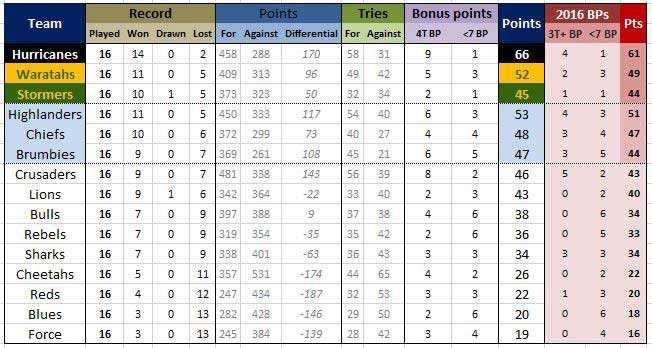I’ll admit it – a couple of law variations and the announcement of the referee’s panel was not entirely how I envisaged getting into Super Rugby for 2016. However, here we are in the first week of February, with something of a ‘soft launch’ into the newly expanded competition.
It’s all driven, of course, by SANZAAR’s announcement this week of a few little law variations for the rapidly approaching season, in which we see the provincial debuts of the Buenos Aires-based Jaguares and the Sunwolves from Japan, as well as the return of the Southern Kings from Port Elizabeth.
The first tweak announced is purely alphabetic – the extra ‘A’ in the governing body’s name, to recognise Argentina’s elevation to full member status among their southern hemisphere rugby counterparts.
SUNWOLVES SUPER RUGBY PAGE
I’m not sure if Australia’s ‘A’ comes before Argentina’s ‘A’, and it probably doesn’t matter, but that’s the kind of debate I’m looking forward to this year!
The SANZAAR announcement comprised three main parts, and I’ll go through them one by one.
Referees, referees everywhere!
As well as gaining new teams, and a couple of new timezones and compass points, Super Rugby in 2016 expands from a panel of 16 referees out to 22, which includes a whopping nine debutants.
Among them are Argentina’s Federico Anselmi and Shuhei Kubo from Japan, along with a couple of former scrumhalves, in former Crusader and Chief, Jamie Nutbrown, and former Queensland Red, Nic Berry.
It’s difficult to escape the irony of a couple of yappy halfbacks now holding whistles, and while Nutbrown has a couple of years’ experience now, Berry has gone from contemplating the idea of refereeing to the Super Rugby panel in a little over twelve months. But good luck to both of them; it’s always encouraging to see recently retired players take up refereeing, and I was impressed with what I saw for myself from Berry during the NRC last year.
But I do want to repeat a concern I aired this time last year. Of the 22 referees on the panel, with the nine debutants, and another three with a handful of games to their name in 2015, more than half the panel have well less than a full season of Super Rugby under their belt. Another six refs have between 21 and 26 games only. They’ve got to start somewhere of course, but gee, it’s a good thing rugby isn’t a game played in front of an incredibly knowledgeable and overly analytical audience.
Bonus points that will become properly bonus
The biggest talking point is undoubtedly the removal of the bonus point for scoring four tries, replaced by one now earned only by finishing with three tries more than the opposition.
If that sounds somewhat familiar, it’s because it’s precisely the system employed in Australia’s NRC for the last two years. The bonus point for losing by less than seven points remains in place for Super Rugby.
Curious, and somewhat egged on by my editor, I retrofitted the 2016 bonus point system to the 2015 table last night to see what kind of difference it might have made to the final standings. Surprisingly, my ingenious use of Excel formulas proved the highlight of the exercise.

Yep, it largely made no difference to the 2015 table at all. The Rebels and Sharks would’ve swapped places in 10th and 11th on the table, and the only other real development was that the Stormers would have genuinely finished in the top six, and the Crusaders genuinely seventh.
Obviously, it’s not an exact science and yes, a different BP system would quite likely have changed the way teams played games out.
What is noteworthy, perhaps, is that where 63 four-try BPs were earned in 2015, that number drops to just 26 under the ‘three-more-than-them’ system.
In 2016, we can essentially kiss losing teams gaining double bonus points from a loss goodbye. With three-point penalties still in play, it is still of course possible for a losing team to score three more tries than their opposition, but I can’t imagine that being overly common.
The system has come under fire in some quarters, with Chiefs coach Dave Rennie suggesting it could have the opposite effect of what SANZAAR are hoping for.
“They think that if you score four tries and the opposition has scored two you’ve got to keep playing and it’s got to make the game better. But realistically, if a team, let’s say we’re up by four tries with 20 to go, we may say, ‘oh, we’re going to close shop’ because the only way the opposition are going to score is by us making mistakes. So you end up slowing the game down and playing less,” Rennie told the New Zealand Herald late last month.
And it’s a very real concern. Unintended consequences come out of nearly every new idea, and some very valid points were raised on this topic yesterday.
All I’ll add – and I certainly won’t claim to know anything close to all the possibilities – is that there have been numerous examples over two seasons of the NRC in which the team who had closed up shop because they thought they had the bonus point sewn up did indeed make defensive mistakes and concede BP-losing tries.
But that actually forced those teams into playing the game right out in attempting to regain the three-try advantage. In the 2014 NRC, there were 17 ‘3T+BPs’ earned, while last season that increased to 18. Both seasons featured 36 regular season games. I can’t recall a losing team earning a 3T+BP, however.
It just might be crazy enough to work.
Siren. Penalty. Play on, gentlemen…
“Permitting teams to opt for a lineout after time has expired serves to disincentive opponents from infringing and aims to reward sides that are particularly strong set-piece exponents which, when coupled with the previously mentioned changes, encourages more attacking and competitive rugby,” so said the SANZAAR release.
Again, this has been in use for both seasons of the NRC, and it will certainly have the desired effect.
Teams trying to kill off late momentum simply won’t be able to kill the ball by any means thinking the half or the game is done. And further, teams who give up 50 and 60 metres of territory and suddenly find themselves defending their line in desperation will either get the hint, or they’ll shell points.
I’m all for this one, and I even wonder if there’s scope for automatic yellow cards for infringements after the siren?
So look, it’s not exactly a bells and whistles start to the season, but after watching an Eden Park disaster at a whole new level of annoyance yesterday, I’m sure glad the rugby season is here.






























































































